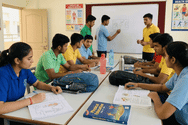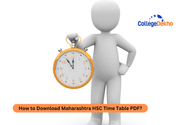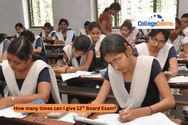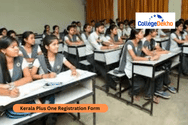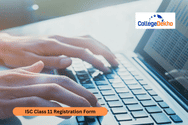CBSE Class 12 Computer Science Syllabus 2026 has been released online @ cbseacademic.nic.in. There are a total of 3 units included in the curriculum.
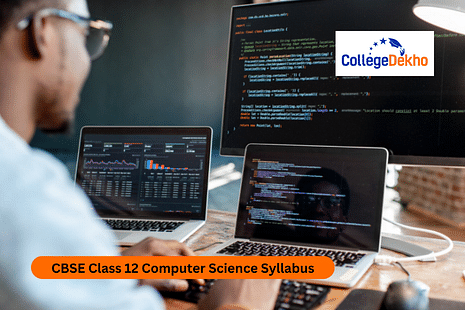

Never Miss an Exam Update
CBSE Class 12 Computer Science Syllabus 2026 is available for students to download from the website cbseacademic.nic.in. 100 marks are assigned for the subject, with 70 marks assigned for theory and 30 marks allotted for practicals. There is a total of 3 units in the theory exam and lab test, report file, project, & viva that come under the practical examination. The syllabus will include chapters like Computational Thinking and Programming - 2, Computer Networks, and Database Management. You are also advised to solve the CBSE Class 12 Computer Science Previous Year Question Paper to understand the difficulty level and type of questions asked in the computer science paper. To acquire the most recent CBSE Class 12 Computer Science Syllabus 2026 PDF, practical syllabus, study suggestions, and other information, read the entire article.
Also Read: CBSE Class 12 Computer Science Sample Paper 2026
CBSE Class 12 Computer Science Exam Pattern 2026
Check the detailed CBSE Class 12 Computer Science Exam Pattern 2026 here:
Unit No. | Unit Name | Marks |
|---|---|---|
I | Computational Thinking and Programming – 2 | 40 |
II | Computer Networks | 10 |
III | Database Management | 20 |
Total | 70 |
CBSE Class 12 Computer Science Syllabus 2026
Refer to the detailed CBSE Class 12 Computer Science Syllabus from the pointers given below:
Unit I: Computational Thinking and Programming – 2
- Revision of Python topics covered in Class XI.
- Functions: Types of function (built-in functions, functions defined in module, user-defined functions), creating user-defined function, arguments and parameters, default parameters, positional parameters, a function returning value(s), the flow of execution, scope of a variable (global scope, local scope)
- Introduction to files, types of files (Text file, Binary file, CSV file), relative and absolute paths
- Text file: opening a text file, text file open modes (r, r+, w, w+, a, a+), closing a text file, opening a file using with clause, writing/appending data to a text file using write() and write lines(), reading from a text file using read(), readline() and readlines(), seek and tell methods, manipulation of data in a text file
- Binary file: basic operations on a binary file: open using file open modes (rb, rb+, wb, wb+, ab, ab+), close a binary file, import pickle module, dump() and load() method, read, write/create, search, append and update operations in a binary file.
- CSV file: import csv module, open / close csv file, write into a csv file using csv.writer() and read from a csv file using csv.reader( ).
- Data Structure: Stack, operations on stack (push & pop), implementation of stack using list.
Unit II: Computer Networks
- Evolution of networking: introduction to computer networks, evolution of networking (ARPANET, NSFNET, INTERNET)
- Data communication terminologies: concept of communication, components of data communication (sender, receiver, message, communication media, protocols), measuring capacity of communication media (bandwidth, data transfer rate), IP address, switching techniques (Circuit switching, Packet switching)
- Transmission media: Wired communication media (Twisted pair cable, Co-axial cable, Fiber-optic cable), Wireless media (Radio waves, Microwaves, Infrared waves)
- Network devices (Modem, Ethernet card, RJ45, Repeater, Hub, Switch, Router, Gateway, WIFI card)
- Network topologies and Network types: types of networks (PAN, LAN, MAN, WAN), networking topologies (Bus, Star, Tree)
- Network protocol: HTTP, FTP, PPP, SMTP, TCP/IP, POP3, HTTPS, TELNET, VoIP
- Introduction to web services: WWW, Hyper Text Markup Language (HTML), Extensible Markup Language (XML), domain names, URL, website, web browser, web servers, web hosting
Unit III: Database Management
- Database concepts: introduction to database concepts and its need
- Relational data model: relation, attribute, tuple, domain, degree, cardinality, keys (candidate key, primary key, alternate key, foreign key)
- Structured Query Language: introduction, Data Definition Language and Data Manipulation Language, data type (char(n), varchar(n), int, float, date), constraints (not null, unique, primary key), create database, use database, show databases, drop database, show tables, create table, describe table, alter table (add and remove an attribute, add and remove primary key), drop table, insert, delete, select, operators (mathematical, relational and logical), aliasing, distinct clause, where clause, in, between, order by, meaning of null, is null, is not null, like, update command, delete command, aggregate functions (max, min, avg, sum, count), group by, having clause, joins: cartesian product on two tables, equi-join and natural join
- Interface of python with an SQL database: connecting SQL with Python, performing insert, update, delete queries using cursor, display data by using fetchone(), fetchall(), rowcount, creating database connectivity applications
CBSE Class 12 Computer Science Deleted Syllabus 2026
Check the CBSE Class 12 Computer Science Deleted Syllabus 2026 here:
Chapter - Computational Thinking and Programming
- Recursion – simple algorithms with recursion: print a message forever, the sum of first n natural numbers, factorial, Fibonacci numbers, recursion on arrays: binary search
- Idea of efficiency: performance measurement in terms of the number of operations
- Data structures: Lists as covered in Class XI, Stacks – Push, Pop using a list, Queues – Insert, Delete using a list. (One of the data structures is Stack or Queue. While setting the question paper a student will have an option between Stack and Queue.)
Chapter - Computer Networks
- Web Scripting Client side (VB Script, Java Script, PHP) and Server side (ASP, JSP, PHP), Web 2.0 (for social networking)
- E-commerce payment transactions using online banking, mobile banking, payment apps, and services
Chapter - Database Management
- Create table, drop table, alter table, update, set, insert, delete.
CBSE Class 12 Computer Science Deleted Practical Syllabus 2026
In addition to the CBSE Class 12 Computer Science theory, the CBSE has also removed certain topics from the computer science practical syllabus. Now, students do not need to prepare for the following topics.
- Recursively find the factorial of a natural number.
- Write a recursive code to find the sum of all elements of a list.
- Write a recursive code to compute the nth Fibonacci number
FAQs
Yes, computer science is a scoring subject in CBSE because it heavily depends upon the practical knowledge of the student. The students need to have basic information about C++ programming to get good marks in theory as well as practical exams.
CBSE Class 12 Computer Science Syllabus 2026 is structured for 100 marks. 70 marks will be allotted for the theory examination, and 30 marks will be provided for the practical exam, which will be conducted by CBSE.
There are a total of 13 chapters included in the CBSE Class 12 Computer Science Syllabus 2026. There are chapters divided into 3 different units to be covered by the students thoroughly so that they can get good marks in the theory as well as practical exams.
CBSE Class 12 Computer Science Syllabus 2026 is not very tough to complete because there are not a lot of chapters included in the theory exam however students still need to cover programming so that they can get good marks in the practical exam.
CBSE Class 12 Computer Science Syllabus 2026 will include units like Computational Thinking and Programming – 2 for 40 marks, Computer Networks for 10 marks, and Database Management for 20 marks.






